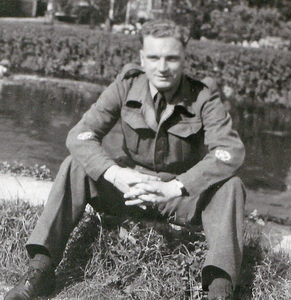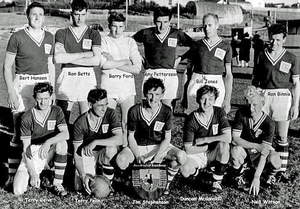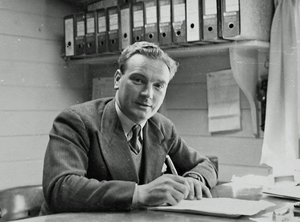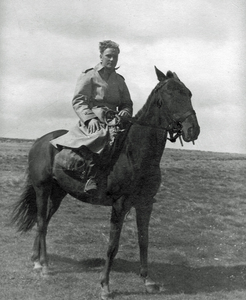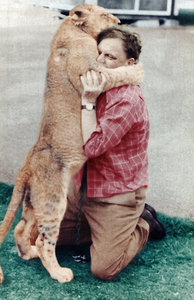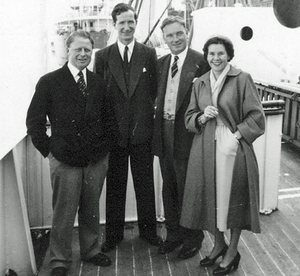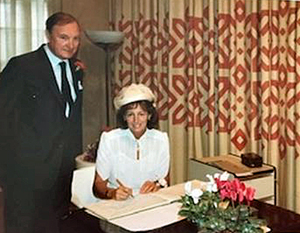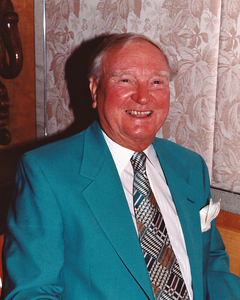CLARK, DONALD JOHN (Don)
1919-2012 from England
soldier, clerk, manager, and company director, served the Falkland Islands Company (FIC) in various capacities for nearly 40 years.
He was born in Bristol on 8 October 1919 to Mr and Mrs Arthur Clark; he was the eldest of four children. The family moved to Reading when Clark was a small child, and he attended Reading Grammar School. He was a keen footballer – playing for the reserve team of Reading Town Football team. He had hopes of becoming a professional footballer, but World War II intervened. Nevertheless, football would remain a passion for the whole of his life.
In 1939 he joined the Royal Army Service Corps as a private. During the early part of the war, Clark served in the British Expeditionary Force in France and was one of the many soldiers who were rescued off the beaches at Dunkirk.
Following his actions during several air raids on his home city of Southampton, Clark received a Certificate from the Commander of Home Forces acknowledging his ‘gallantry and meritorious service’, and this was noted in the King’s Birthday Honours List in 1943.
In July 1942, Clark arrived in the Falklands on board the troopship Strategist as a staff sergeant in the RASC (he was later promoted to warrant officer) with some 250 men of the 11th battalion of the West Yorkshire Regiment (Prince of Wales’ Own). This had been dispatched to establish a ‘Falklands Camp’ on the outskirts of Stanley to serve as a deterrent to Japanese and South American threats to British interests in the South Atlantic. (The land used by the army for the camp later became the property of Harold BENNETT and is consequently known today as ‘Bennett’s Paddock’)
Clark played football in the Falklands while still serving in the Army - including in a derby match between two corps football teams in May 1944, when his goal gave victory to his team. He also played against local teams – and eventually, when he was discharged from the Army and living and working in the Falklands, he captained a Stanley local team (the Redsox). He later became the Chairman of the Falkland Football League. He was also a top cricketer and excellent batsmen. Cricket was revived in the early 1960's in the Falklands, and he was a consistent and respected member of the Stanley side. He played against visiting Royal Navy ships on many occasions.
Clark was also a member of the Stanley Sports Association and was a regular, working in the Tote year after year. The last horse race of the meeting was always the Tote Race (now Association race) and Clark regularly had a mount and indeed won the race on several occasions. He was considered to be a competent jockey.
Back in the UK, and after his discharge from the Army, in December 1945, Clark was appointed a clerk with the Falkland Islands Company (FIC) for a period of three years from the date of sailing from the United Kingdom at £250pa plus a house allowance and a cost-of-living bonus. He arrived in the Islands on board the Fitzroy on 16 August 1946. His wife Marjorie née Windsor (1913-1979) joined him on 26 November 1946.
Clark’s position within the company rose over time. In 1947 he was appointed chief storekeeper (in succession to TW Campbell) and by 1959 he had become the manager of the Company’s West Store in Stanley. His salary had risen to £850 p.a. plus one half of one percent of the gross amount of dividend paid to the ordinary shareholders of the company and he was provided with an unfurnished house.
Clark was a very sociable man, and he participated in many of the social activities in Stanley. He continued to play football for a local team (including playing against teams from various visiting Royal Navy ships). The FI Weekly News in April 1947 described Clark as ‘the star player’. He often acted as the quizmaster during the regular FI Sunday night radio broadcast quiz nights. He organized and produced a broadcast radio programme called ‘Calling all FIDS’. Clark was one of the organizers of a charity ball at Government House in April 1947, and he was often invited to play snooker with Governor ARROWSMITH. He was appointed a Justice of the Peace.
During this time Clark made a number of long-standing friendships – with Des and Ning KING, with Captain Freddie and Nell WHITE, with Captain Bill JOHNSTON and with Frank MITCHELL. Long after the Clarks had left the Falklands these friendships were constantly renewed whenever the friends were together in the UK. ‘Whenever Bill Johnston arrived at Southampton with his ship (RRS John Biscoe) he always stayed at the Clark’s house until it was time to visit his sister in Ireland. Every evening they went out either into Southampton or to Poole, for horse or greyhound racing.’ (personal comment: Marlene Clark
In 1957 Clark was approached by Kenelm PIERCE-BUTLER the manager of the Argentine Compañia Argentina de Pesca whaling station at Grytviken on South Georgia to run a ‘beer-only’ slop chest at the station for the 400 summer whalers following complaints that supplies from Norway were expensive. This led Clark to make contact with the president of the company, Alfredo RYAN, a Gibraltar born Argentine entrepreneur of Irish extraction. Clark was an ambitious man and eager to further his career. However, he was disenchanted with his future prospects with the FIC in Stanley, so when in 1960 he was approached by Ryan to become a director of Albion Star (South Georgia) Ltd, which had been established to transfer the Pesca whaling company from Argentine to British status, he readily accepted.
In the course of his work as an able administrator, Clark, with the support of two FIC directors, Arthur BARTON and Hugh HARDING, helped to oversee the smooth transfer of the Pesca company to British registration. He established Albion Star offices in Southampton and at the whaling port of Sandefjord in Norway. He liaised with whaling station management at South Georgia and was responsible, with his Norwegian partners, for concluding a lease agreement with the International Fishery Company of Japan in Norway in July 1963.
However, Clark was not content with Ryan’s cavalier style of business, and on 30 September 1963 he resigned his directorships in Albion Star and its Norwegian subsidiary. The FIC, having sorely missed his managerial qualities, invited him to return to their employment. He was based in their London Office in Pall Mall, where he served on the company’s board.
The FIC decided to diversify away from its core business of sheep farming in 1963, and this resulted in the creation in January 1966 of Southern Ships Stores Ltd, Southampton, suppliers to the FIC and major shipping companies - Clark became the managing director. The company was founded by the amalgamation of several businesses, two of which JG Boyes and HW Goodwin were already part of the FIC. The company expanded greatly supplying shipping companies with meat and fish, deck, engine and cabin stores supported by a bonded warehouse operation.
When the FIC, including Southern Ships Stores, was taken over by the Dundee, Perth & London Securities in 1972, Clark was appointed to the Board of the FIC. In 1973 a bid by Charrington Industrial Holdings for Dundee Securities was agreed and in 1978 the group, including the FIC was absorbed by the Coalite & Chemical Products Company, known as the Coalite Group in 1981. In 1989 the Coalite Group with the F.I.C. was acquired by Anglo United. In 1997 an opportunity arose to re-establish the FIC as an independent company again, listed on the stock exchange.
Southern Ships Stores became a separate company in 1981 and supplied goods to many large shipping companies, including P & O and Cunard. In 1982 the company provided stores for the Canberra and QE2 at very short notice, prior to their sailing south during the 1982 Falklands Conflict, but embarrassingly had to admit that all of the beef was of Argentine provenance. Clark remained the managing director of the company until he retired in 1984.
One of Don Clark’s more unusual interests was the care and welfare of orphaned lion cubs. Over a period of time, he raised three lions at his Southampton home until they were relocated to zoos.
Clark’s first wife, Marjorie, who did not care for Falklands life, died about 1979. In September 1983, he was remarried to Marlene Malizia, the daughter of a Southampton turf accountant, Charles Malizia. In 1986 the Clarks left Southampton and moved to Sotogrande in Spain, where ironically, they made acquaintance with the Triay brothers, two of Alfredo Ryan’s Gibraltarian legal practitioners and partners in the Albion Star whaling business. During their time in Spain, the Clarks travelled extensively around the world – including two cruise ship visits that called at Stanley. The Clarks were on-board the QE2 when she called at the Falklands in 1993 during a world cruise. Later trips enabled the Clarks to renew old friendships – these included a visit to New Zealand where they met Christopher BONNER and his family and to Australia where they stayed with Jimmie ROBERTSON and his family.
The Clarks loved their time in Spain, however, in his later years Don Clark did not enjoy good health. They returned to live in Poole, Dorset, in 2005.
Don Clark died on 18 June 2012.
Editorial comment:
Patrick Watts, journalist and former Manager of the Falkland Islands Broadcasting Service remembers: 'Don Clark was 'Mr. Football' during his period of time that he lived in the Falklands. He was in a unique position, as Manager of the West Store, to organize games, hold regular committee meetings, request financial assistance from his boss - the formidable A.G. BARTON - who was the F.I.C. Manager, to pay for the annual trophies. He was unanimously re-elected Chairman year after year. He was a gentleman both on and off the field and because he was a very gifted and skilful player he was regularly fouled but never retaliated despite being black and blue on occasions. He had what we call an 'educated' left foot (his position was the traditional inside left) and was an excellent header of the ball and scored a multitude of goals.
He also ensured that those who were not good enough to feature in every league game (no substitutes allowed in those days) were given an opportunity to play, usually in the 1st game of the 2nd round of fixtures. He would encourage the opposing captain to adopt the same approach, and no-one would dare question his firm but polite approach in this respect. He introduced a popular six-a-side tournament which would be played at the end of each season.
One of his secretaries told me that her first job every Monday morning was to type up a list of the Redsox team members which Don Clark had chosen to play on the following Sunday. Each player would receive, in the post, an envelope which contained the names of the selected side. When his league team Redsox finally won the Championship, he was carried off the field, shoulder high, by members of both teams. He was held in such high esteem.
When he was due to leave the Falklands, he called me up and asked me to pop down to his house on Ross Road. He had carefully made up a packet containing his shorts, socks, boots etc which he gifted to me. I was overwhelmed by his kindness.
I recall that one of his return day visits to the Falklands coincided with a game being played that evening. I approached him to say 'hello' and ask what he thought of the game. He expressed an air of disappointment - not at the quality of football being played - but for the fact that not all of the players were wearing the same colour shirts. He never said it outright, but I knew that he was thinking that this would never have been allowed to happen when he was Chairman of the F.I. Football League.
Don Clark, who I had the pleasure of watching on the football field, offered me much encouragement and material support.'
Comments
Richard Malizia
2021-08-18 08:13:06 UTC
What an absolutely beautifully written piece. It has flooded me of my own wonderful memories of Uncle Don. He was an absolute gentlemen to me, a wonderful inspiration to me and my own sporting interests. I'd often sit alongside Uncle Don and my grandfather watching Mick Channon, Kevin Keegan at the "DELL" home of Southampton FC. So many more memories.
Matthew and Marie Miniter, USA
2021-08-21 12:15:19 UTC
Having met Don & Marlene Clark on an Alps Tour in 2002, and unfortunately knowing Don for only 10 years (way too short), we can say with absolute certainty what a gentleman and wonderful kind and generous man he truly was. Once you knew him, you knew you had a special friend.
Revisions
August 2021 Biography first added
